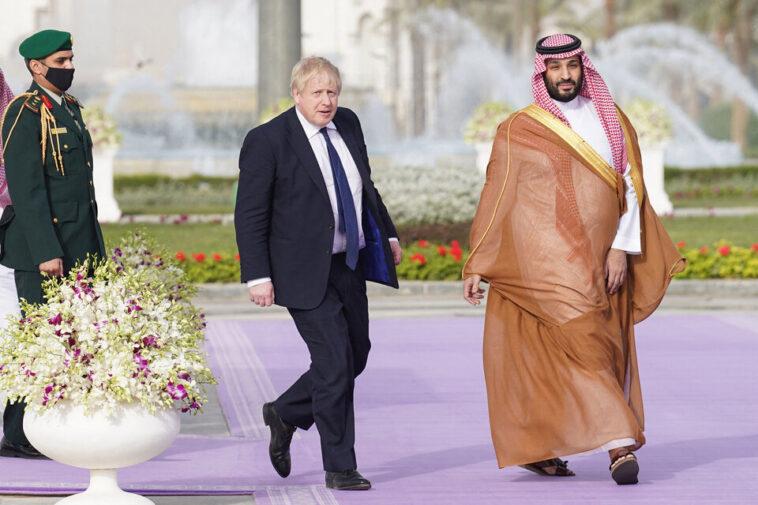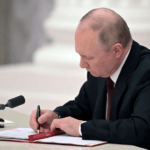From London
In the midst of the sudden international rearrangement due to the Russian invasion, the talks between the Joe Biden and Maduro governments and Boris Johnson ‘s decision to end dependence on Russian oil through negotiations with the democratic Saudi Arabian regime that decapitated the Saturday to 81 people.
Between holes, threads and imitations so visible, there are others that go unnoticed. The UK Financial Crime Bill is an example. In theory it is a symbol of the British decision to put an end to the use of tax havens by Russian oligarchs, the axis of their strategy to destabilize the government of Vladimir Putin. In practice, it is full of legal loopholes that make it more of a tricky rhetorical exercise to save Boris Johnson’s government than an effective tactic in the rarefied diplomatic arena that opened the war.
The British Butler
The current Economic Crime Bill that has passed the House of Commons and is being debated by the House of Lords has a winding and checkered history. David Cameron proposed it with a stern gesture at an international congress against corruption held in London in May 2016, shortly after he was one of the leaders (along with Mauricio Macri, among others) named in the Panama Papers scandal. That same year , the referendum in favor of leaving the European Union took the issue off the agenda.and Cameron from the government. It resurfaced in 2018 with a bill drafted and shelved by the government of Cameron’s successor, Theresa May. May’s successor, Boris Johnson, ruled him out in the 2019 election campaign and again about two months ago. The Russian invasion dusted him off and made him up so that, in a magical pass, he looks like new.
The project contemplates the publication of the final beneficiaries of foreign companies registered in the United Kingdom , amendments to the financial sanctions law and a reform of the UWO (unexplained wealth order) for the detection of high volume operations and obscure origin. According to conservative rhetoric, the aim is to “guarantee financial transparency” with new regulatory measures. It is not a marginal phenomenon. At stake, only in the real estate chapter, there are more than 80 thousand properties that together are worth about 100 billion pounds and that belong to shell foreign companies based in tax havens.
The problem is that, according to one of the great British experts on the subject, Oliver Bullough, the measures are not only insufficient but also have so many legal loopholes that they will not serve to detect any property in the hands of a front company of Russian billionaires.or from any other part of the world. “The Project’s definition of a beneficial owner is that they have 25% control of the offshore company. This is a very easy regulation to get around. The oligarch can divide the property into five parts with relatives each holding 16.67% of the shares. Neither will have to reveal her identity. Another way is to own the company through a corporate Trust (… fideicomiso….) So you will not have to give his name. I detect these mechanisms that I am naming without being a lawyer. Imagine what the City’s legal experts can do with these measures,” the author of “Butler to the World: How Britain Became the Servant of Tycoons, Tax Dodgers, Kleptocrats and Criminals” writes in The Guardian .
There are other, more basic forms of fraud pointed out by the author of “The World’s Butler: How Britain Became the Servant of Tycoons, Tax Evaders, Kleptocrats and Criminals.” The most obvious is within the reach of a five-year-old: lying. At the heart of the bill to reveal the beneficial owners of foreign offshore companies with UK property is Britain’s company registry, Companies House, which has been massively deregulated over the past 10 years.
Gruyère cheese
Last year, the Companies House had some 3 million companies with an annual incorporation of some 550,000 new entities. This means that more than 1500 companies are registered every day. The online procedure costs the equivalent of about 15 dollars, it is done in minutes and the approval arrives in less than 24 hours. The information check is null.
A farcical saga reveals the institutional degradation of that Gruyère cheese that is the Companies House. In 2013, a civic-minded businessman, Kevin Brewer, tried to show the government that there was a lack of checks on the data that companies presented in the registry. Brewer founded a company with the name of the main person in charge of the issue at the government level who appeared as the sole shareholder of the company: John Vincent Cable Services Ltd (name of the minister of business and innovation).
In a letter to the minister, Brewer cited this example to demonstrate the impact that deregulation was having. The only response he got was a stern admonishment from John Vincent Cable’s own adviser who assured him that the system worked wonders.
Brewer insisted years later, with the government of Theresa May, successfully founding another invented company. At the end of 2017, Companies House took him to court and he had to settle out of court so as not to lose his clothes. Ironically, Brewer was the first case that Companies House brought to justice among the tens of thousands of companies that registered each year. The bill does not solve this pathetic institutional mechanics for data checking.
In “The Financial Curse”, Nicholas Shaxson describes the United Kingdom as a state trapped in a labyrinth of financial opacity that permeates its political, institutional and legal life. The reign of the city and its financial network and tax havens have colonized and limited the different governments and their ability to react: this is what is happening with this legislation, the theoretical centerpiece of the sanctions against Putin.
No money anywhere
Even if the law did not have all these holes, a well-funded institutional framework would be needed for its implementation. The National Crime Agency (NCA) and the Serious Fraud Office, which deal with all kinds of financial crime, have nowhere near the funds or staff to fight the army of lawyers and accountants that the kleptocrats, billionaires evaders and gangsters to take advantage of and/or create legal loopholes that launder the most opaque funds.
According to the NGO, Spotlight on Corruption, the NCA’s budget has decreased by 4.2% in the last five years. Last year, in her farewell speech, outgoing NCA director Lynne Owens noted that the agency needed a 54% budget increase to deal with the financial crime epidemic that Covid has exacerbated with all kinds of scams. to the treasury
Spotlight on Corruption calculates that the UK spends 0.042% of its GDP to fund state agencies fighting financial crime equivalent to 14.5% of GDP. “The NCA estimates that fraud causes losses to consumers, businesses and the public sector of around 190 billion pounds per year and that money laundering causes losses of 100 billion pounds,” says a report by the NGO.
The Russian oligarchs are just a tiny fraction of all this money that the UK Tax Haven has created. According to estimates, always approximate in a subject of such opacity, they represent about a billion pounds of the opaque real estate universe in the United Kingdom.
the past condemns me
Home Secretary Priti Patel pointed out during the debate in the House of Commons that a new law will be needed to complement the current one. The chances of it doing so are slim to none given the government’s scant credibility and political will to confront the combined interests of the City of London, the huge sums of money laundered and the conservative libertarian ideology itself.
In January Treasury Fraud Secretary (his title is “Fraud Secretary”) Lord Theodore Agnew resigned because, he said, “it is impossible to defend the government’s conduct in this area”. Last year the ineffable Boris Johnson ridiculed his own parliament’s intelligence and security committee report on the influence of Russian kleptocrats, accusing them of being anti-Brexit.
These funds have fed the coffers of the Conservative party during the four consecutive victories they have won at the polls since 2010. There is an iron alliance, difficult to melt. This is the explanation of the pendulum policy of the Conservatives and especially Boris Johnson with Russia, but also with China or with any opaque fund that enters via the City of London, “no questions asked”.
Paul Mason, former BBC economics editor, author of “Meltdown,” an analysis of the 2008 financial crash, predicts a swing of the pendulum. “Boris Johnson’s relationship with Russia and China is bipolar. He goes from direct cooperation with his oligarchies and the maintenance of London as a center for money laundering to sudden attempts at confrontation, ”says Mason.
For Johnson, Russia has been a political lifeline from the party scandals at 10 Downing Street in times of a pandemic and the current crisis in living standards. A bill that apparently tightens the regulatory regime, but is so full of holes that it is useless, is a perfect solution to feed that ambivalence that Paul Mason detects, to continue with the pendulum of the one that barks a lot and bites little.




GIPHY App Key not set. Please check settings